“In this type of game, if you attack quicker than you should they make transitions and you suffer a lot,” says Pep Guardiola. “We wanted to make the right tempo — not slow, not fast — to make this incredible stadium quiet.”
It was Copenhagen’s Parken Stadium that Manchester City needed to tame on that occasion, but it is easy to imagine a similar approach at Anfield on Sunday.
“I had a manager who said when you start in a big stadium with a big crowd, shouting, pressure, you should make a thousand passes,” Guardiola continued. He was talking, of course, about Johan Cruyff. “It’s not allowed to score a goal, just passes, and the stadium is low down (quiet). And this is what we tried to do.”
Guardiola had settled upon his game plan after studying videos of Copenhagen and deciding that one of their biggest strengths, if not the biggest, was their crowd. So he set out to nullify it by making an excess amount of passes.
There was a clip from that game that was shared across social media. It showed Guardiola and John Stones exchanging ideas, with the latter suggesting to his manager that he should drift over to the right-hand side to help his team-mates create an overload. A good idea… but not the right one at the time.
“Pep said for me and Rodri to play close together when we had the ball to have the short passes,” Stones told The Times last week.
Those short passes are the foundation for matches like that — if not the foundation of Guardiola’s entire managerial style and the success that stems from it.
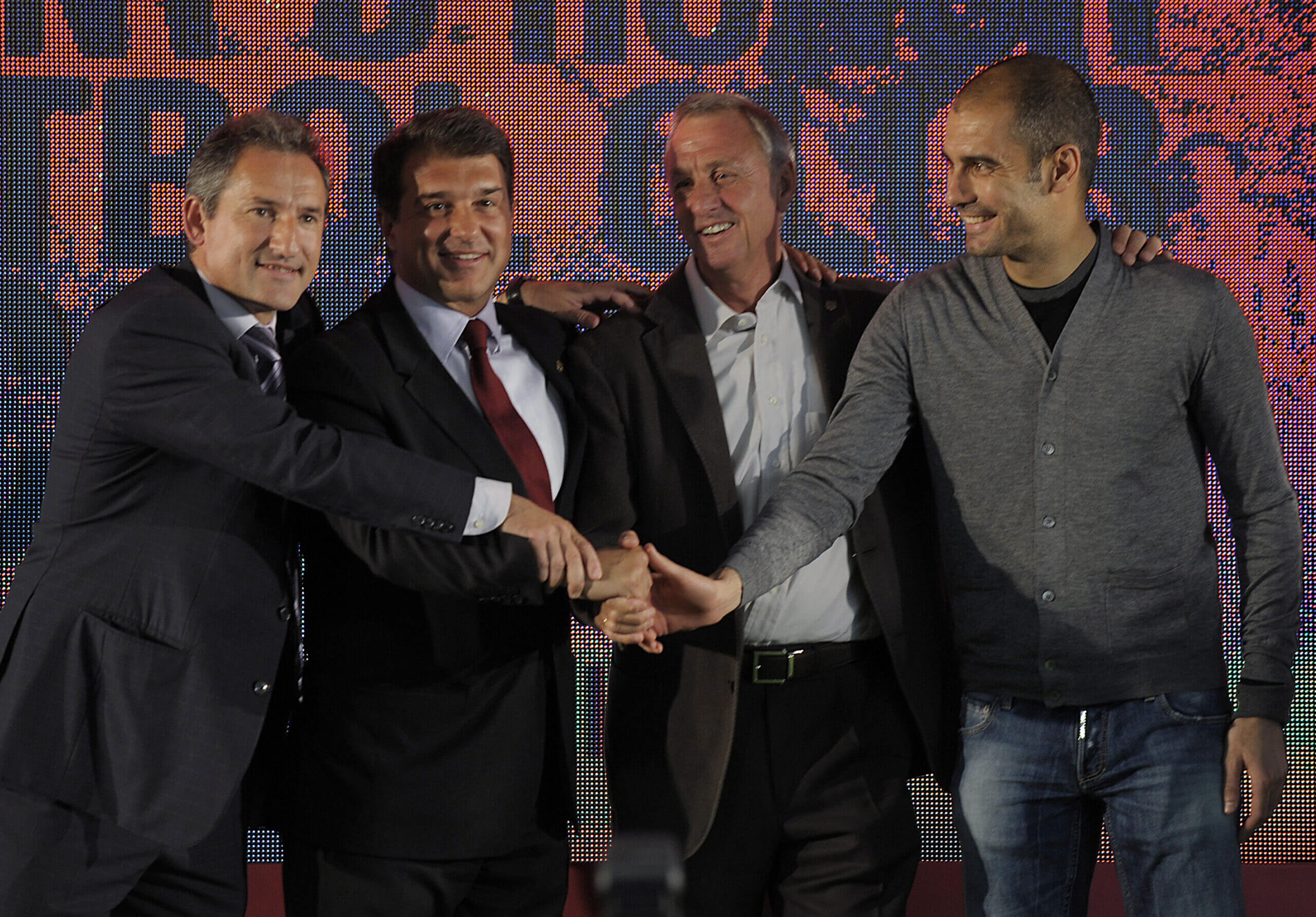
From left: Txiki Begiristain, Joan Laporta, Cruyff and Guardiola at Barcelona in 2010 (Lluis Gene/AFP via Getty Images)
In truth, making “1,000 passes” is not just his answer to keeping a crowd quiet — and it is not just about the start of games, either.
After City beat Chelsea 1-0 two years ago, Guardiola noted how the match, which his side had previously dominated, had become stretched at the end because the Blues started attacking more and his own team had space to break into. But it’s something they should not have done.
“Chelsea made a step up and that helped us make transitions,” Guardiola said. “Our fans are so satisfied to see it, but if you don’t finish that action, they (Chelsea) can make the transition and they are unstoppable, like Liverpool.
“There were (opportunities) to do it — they were so clear. But in that moment, you have to bring the ball to their half and make 20,000 million passes; that’s the only way.”
Liverpool v Manchester City could help decide the Premier League title race – and The Athletic is analysing every angle that matters.
Just a few weeks ago, it was a similar story against Sheffield United at the Etihad Stadium.
“After 2-0, they didn’t press so we decided ‘passes, passes’ to avoid what happened against Crystal Palace (a 2-2 draw) and the other games,” he said.
There was not an awful lot wrong with how City managed the game against Palace. They controlled the vast majority of the closing stages anyway, only to give away a soft penalty. But the aim for Guardiola is always more control.
And making 1,000 (or even 20,000 million passes) is not just about, well, making passes. As Guardiola noted after the game in Copenhagen, City made their passes at “the right tempo: not slow, not fast.”
There can also be an issue of passing for the sake of it. During pre-season in Asia last summer, Nathan Ake explained one of the big tactical lessons he learned after joining City in 2020: “In my first season, we played against Leicester at home and we lost 5-2. We had a lot of possession (72 per cent) but I didn’t really do anything with it.
“I just thought we had to keep the ball and keep it moving. I thought I had done OK, and then the manager called me into his office and showed me clips.
“He said, ‘If you’re just going to pass to the left and right and don’t commit the strikers, then you don’t join the structure and it’s difficult for our attackers to attack.’”
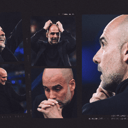
There is a huge emphasis on City’s players being comfortable receiving the ball — and holding onto it — under pressure, from both opposition players and supporters, and that is one of the biggest areas in which the team has improved over the years. It makes them better equipped for matches in hostile arenas.
“Character is more useful than statistics,” Guardiola told the author Marti Perarnau after City were knocked out of the Champions League in 2016. “And I have not known how to give them character so that they are not afraid on big stages. They don’t believe it. I feel that there is a fear of playing, that they do not feel comfortable being active, and that they are better off being reactive.”
Anfield is one of the ultimate tests, and given Guardiola has always known the importance of keeping the ball, especially in that kind of match, there has been an element of his side needing to improve their own appreciation. Then there is the ability to do it while you’re being chased down by, say, Mohamed Salah roared on by 60,000 fans.
“In these types of games, you have to keep the ball — two or three touches. Being pressed, you have to keep it as Erling (Haaland) has done,” Guardiola said after City won at Arsenal last season, although he was bemoaning the fact that his side did not do it enough.
“Midfield players and everyone (have to do it) and we were not able to do it today.”
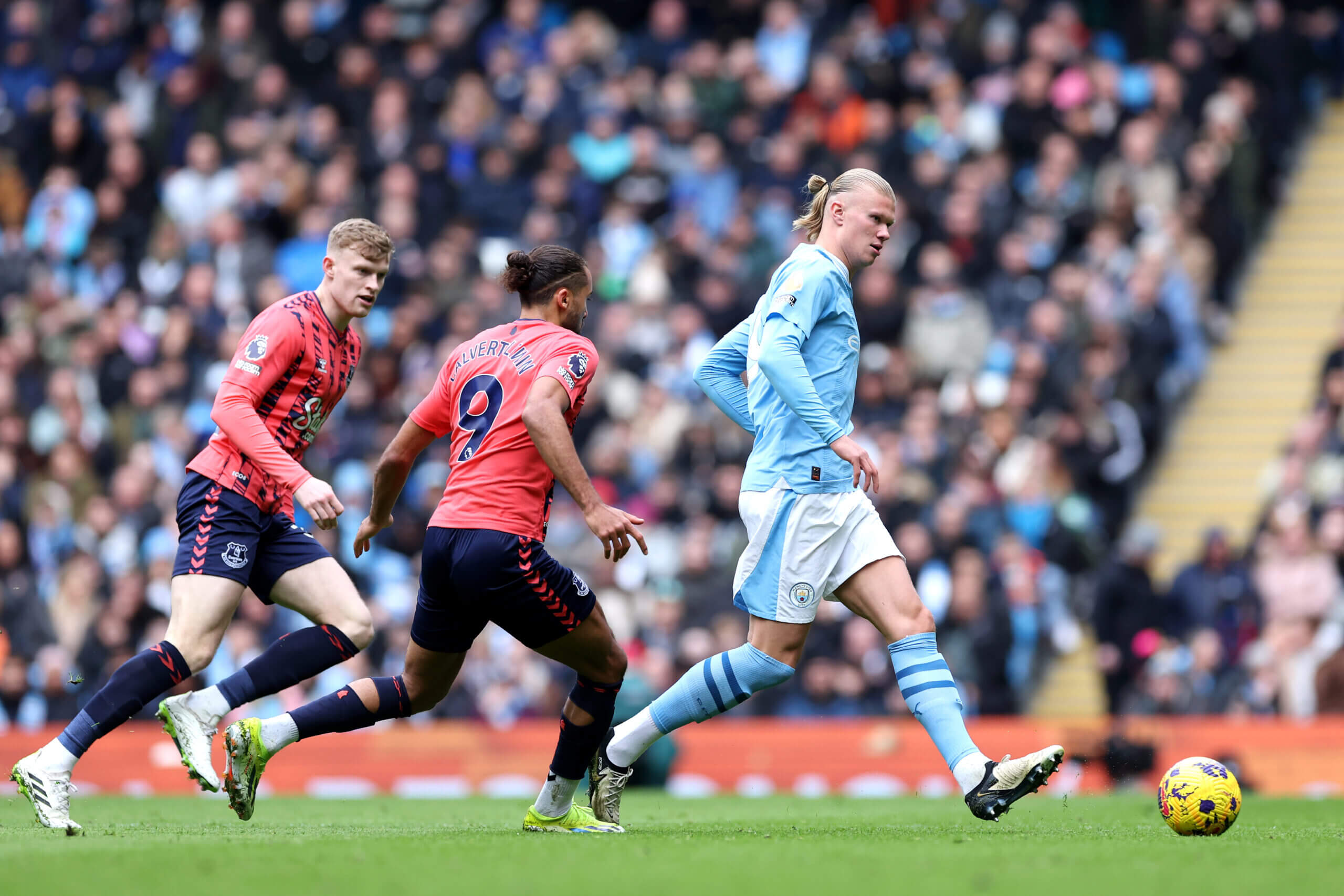
Haaland during the February’s league match between City and Everton (Alex Livesey/Getty Images)
Perhaps one of the most obvious examples of City keeping things tight at Anfield came early in the 2018-19 season. In the campaign before (2017-18), City had played there twice, in the league and Champions League, and conceded seven goals.
This time it was 0-0 and far less eventful — exactly what Guardiola would have wanted. But comparing City’s approach on that day four and half years ago to how they approached the same fixture last season, or even without fans in 2021 due to the Covid-19 pandemic, it is clear that they are better prepared in that aspect of the game now, even if the result does not always match.
One big difference, for example, is that in Guardiola’s early clashes with Liverpool, he was keen to avoid the “mouth of the wolf”. This was how the City coaching staff referred to Liverpool’s intention to force their opponents into the middle of the pitch and then close in quickly to try to win the ball close to goal.
In the 2018-19 clash, whether as a result of Liverpool’s organisation or City’s hesitance to play into that area (or a bit of both), they rarely found Fernandinho. But when they did, he moved it quickly (even without any opponents in close proximity) to Benjamin Mendy at left-back, who in turn would always play forward, often losing the ball.
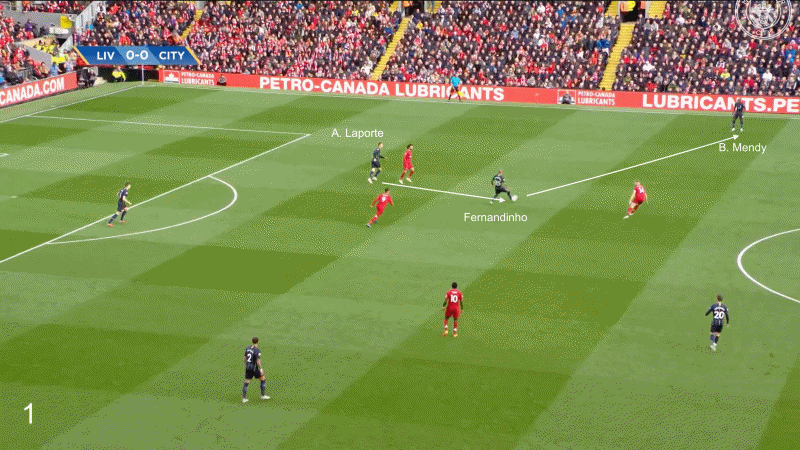
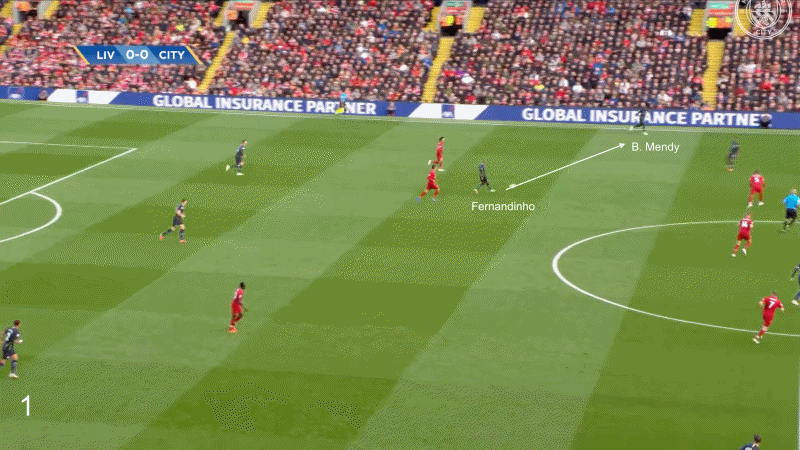
“It depends on the quality of the players,” Guardiola said when asked about these “1,000 passes” this week. “For example, Jack (Grealish) has the speed to go but has more control than Jeremy (Doku), so the rhythm will be a little bit slower.”
As another example, whereas Mendy was wired to go forward and attack, Oleksandr Zinchenko was very comfortable keeping the ball under pressure — and was so committed to it during the no-fans game that he dribbled back towards his own box rather than give possession away cheaply.
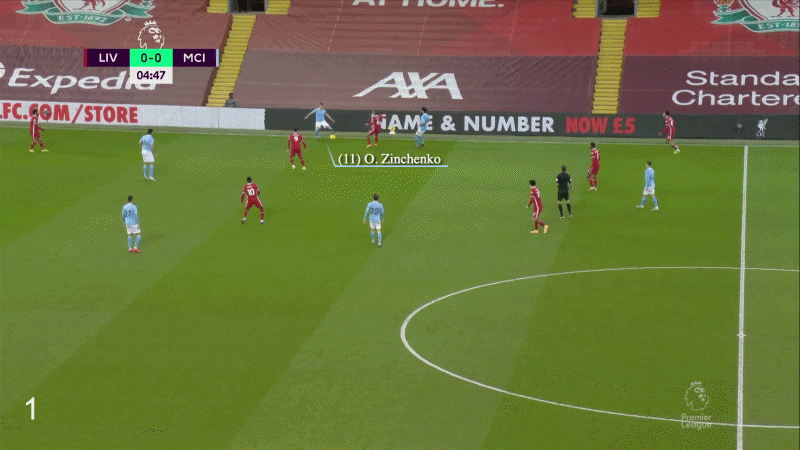
City are still careful when moving the ball into the middle of the pitch, but in Rodri, Ilkay Gundogan and Bernardo Silva — who has often dropped deep over the years — they have people who are more comfortable holding onto the ball even under intense pressure, knowing that they can shield it and find somebody else in space, who can then switch it to the other side of the pitch.
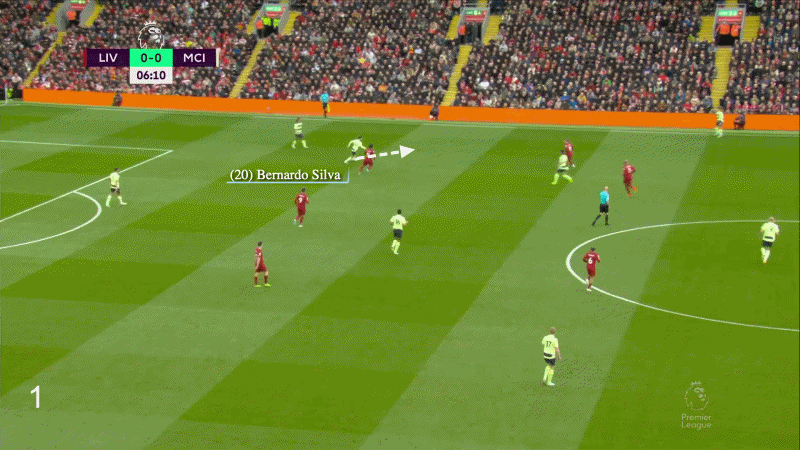
They might even run forward with the ball looking for an opening, but will still be more than happy to turn around and find another defender, or Rodri or Ederson, for the whole process to start again.
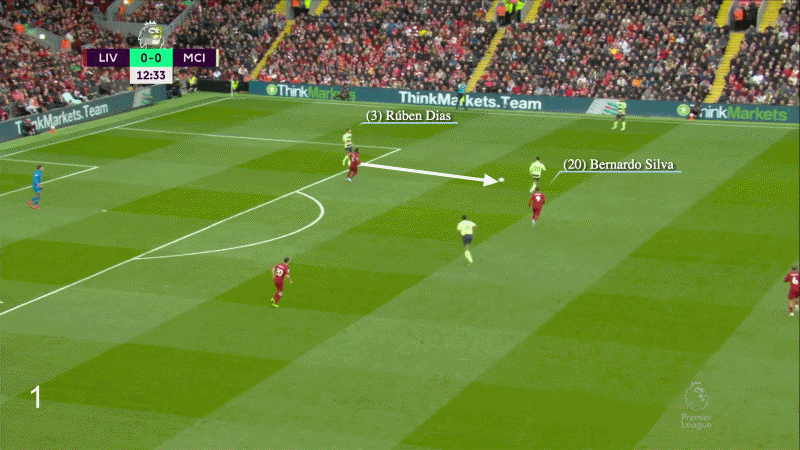
Seven minutes into last season’s clash, City strung together a 39-pass move, mostly made around the centre circle, moving left and right and back again, before Joao Cancelo put a cross into the box that only just evaded Gundogan.
However, in 2019-20 — the season that Liverpool would go on to win the league — City seemed to pay less attention to being patient, and one early passage of play sums that up: John Stones was forced to go high down the line because he could not find Rodri. Bernardo then helped it on down the line high towards Kevin De Bruyne, who then picked up the loose ball, charged into the box and crossed. City appealed for handball; Liverpool went down the other end and scored.
“Always I have the feeling that if you make a transition so quick and you score a goal, well done,” Guardiola explained this week. “But if you don’t score a goal, they (the opposition) make a transition against you. As quick the ball goes, as quick the ball comes back. And with more opponents coming back at you!
“I know the fans want three passes to score a goal — me too — but we play against teams who are smart enough to know how to control that.”
In a pulsating 2-2 league draw at Anfield in the 2021-22 season, City appeared to purposely set out to be more direct in their passes forwards — which shows that Guardiola can surprise.
In the return game that season at the Etihad (also 2-2), City actually adopted a more Liverpool-like approach and played long balls in behind Jurgen Klopp’s defence. At Anfield, they were also quick to play balls in behind, or play longer passes to the wings…
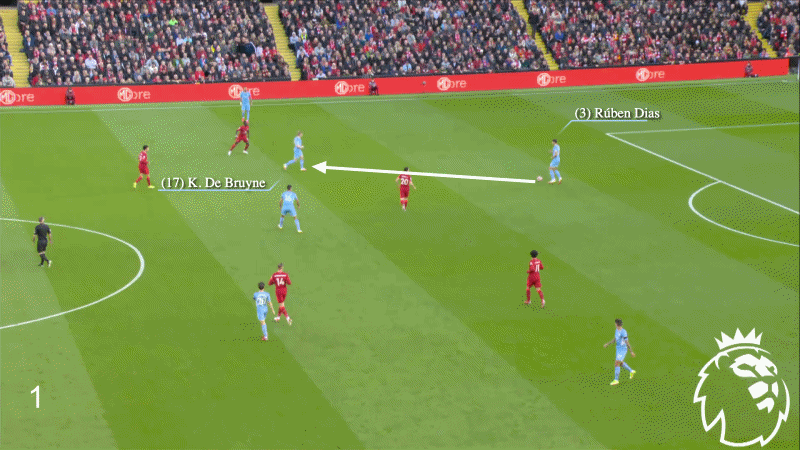

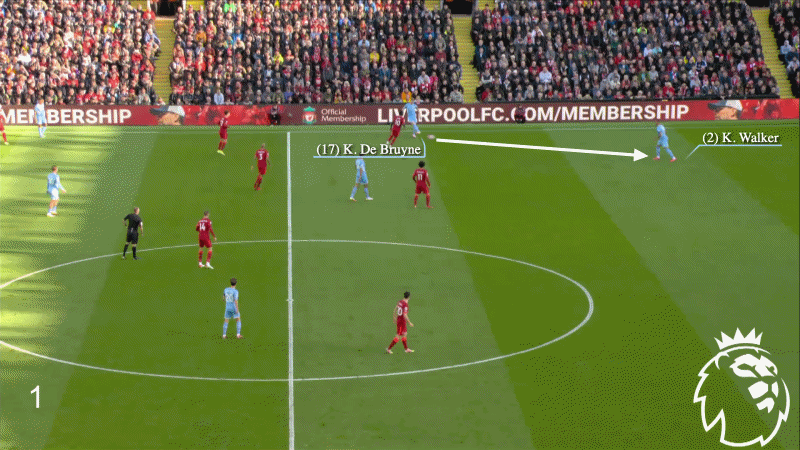
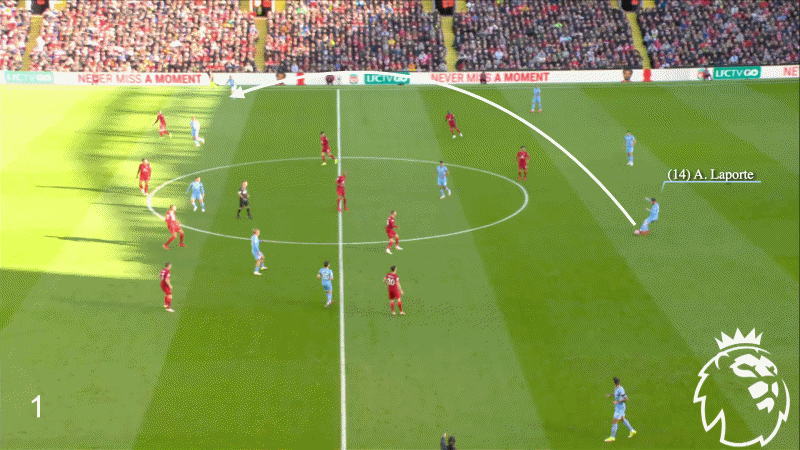
Even at Anfield, though, it was still notable how players — particularly Bernardo and Cancelo — were calm enough to keep the ball in very tight areas, allowing City to create spaces elsewhere.
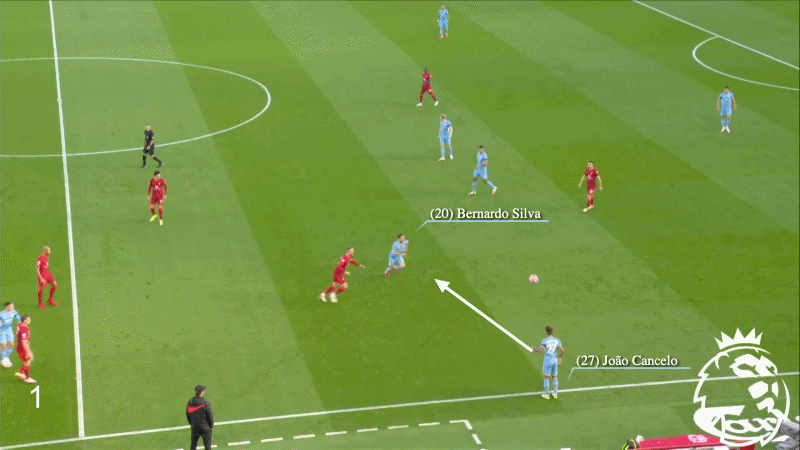
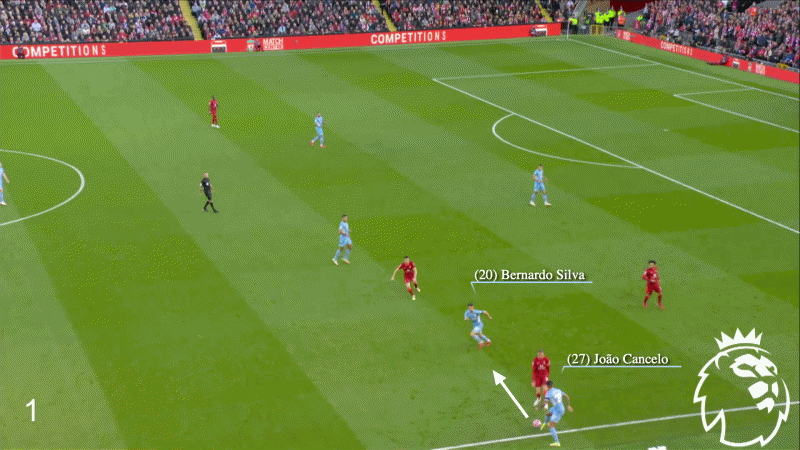
Recent games have highlighted how this trait is important to City, especially when teams press man-to-man.
“We need the players today to not play one touch, we need to make a lot of touches, every player, because when you play against man-to-man and you play one touch, that is what they want,” Guardiola said after the 1-0 win over Bournemouth last month.
“We need Bernardo and Phil (Foden) and John and Rodri, who have the ability to keep the ball, Manu (Akanji) and Nathan, everyone has two or three touches.”
And there was a similar reflection after City beat Luton Town in the FA Cup three days later. “Every time we play one touch, we lose the ball,” he said, “Every time a player has three or four touches himself, we can make extra passes, we can move the structure that they have. They lose the control, and at the right moment you can attack, and we did it really well.”
So yes, while Guardiola said City were “not allowed to score a goal” in Copenhagen three weeks ago, it may have been a slight exaggeration given City scored after 10 minutes and had good chances before that. Because if you do the job well enough in defence, it brings you to the final third.
“We can do transitions, quick actions, but we are not built to do this all the time, so that’s why we are more comfortable with a lot, a lot of passes and flying or moving all together,” Guardiola explains.
“We feel more comfortable as a team but with the speed of Kevin, Matheus (Nunes), Mateo (Kovacic), Erling of course, Phil, we have a base to sometimes do transitions and when we can do it we have to, we cannot avoid it.”
But you better be sure that 1,000 passes need to come beforehand.

(Top photo: Getty Images)


